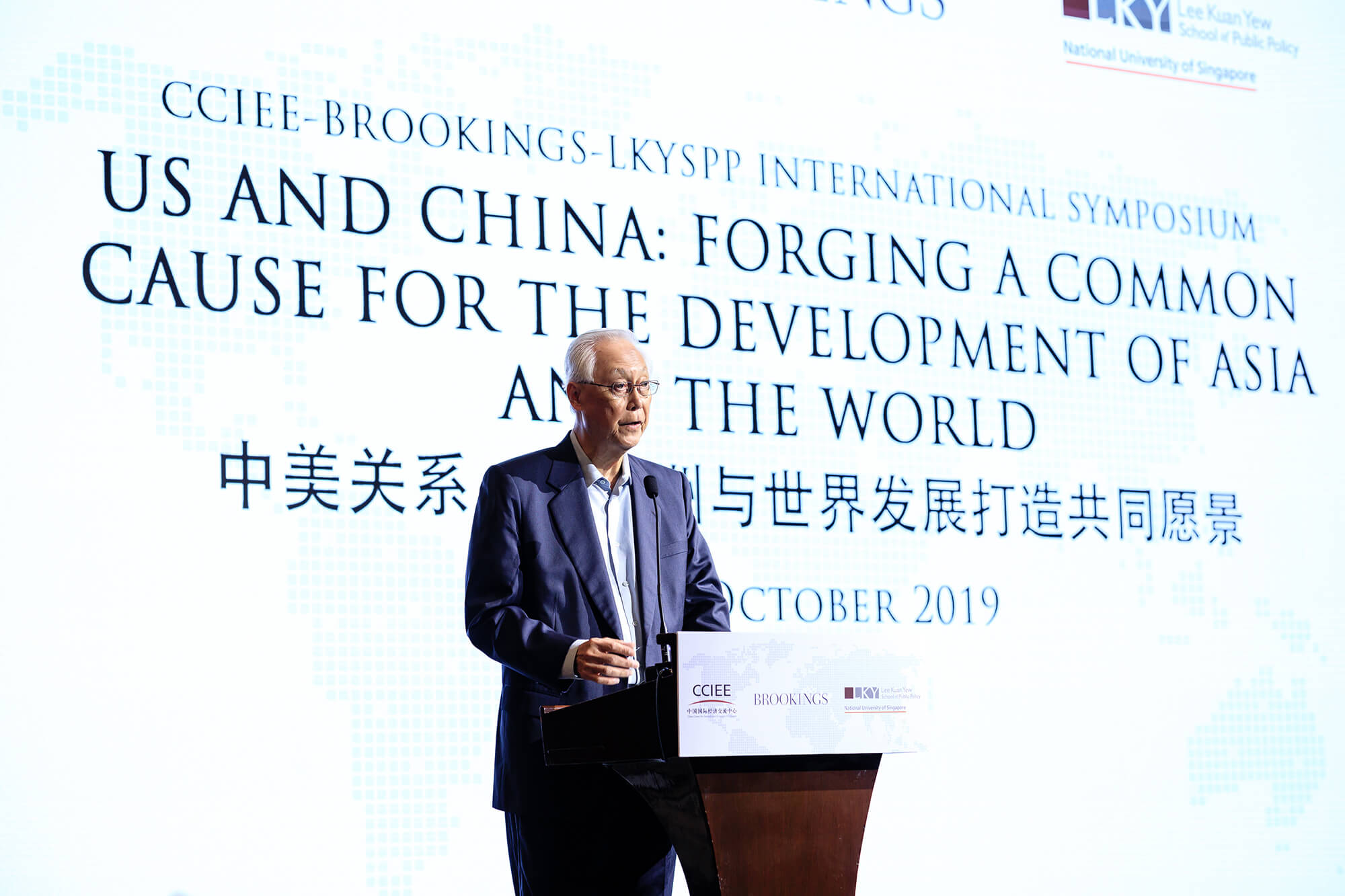Asia needs to play a more pivotal role in establishing common ground between the United States and China, as the deepening rivalry between the two superpowers risks destabilising the current multilateral world order.
Urging greater cooperation between the two nations, Emeritus Senior Minister (ESM) Goh Chok Tong warned an all-out conflict "would be disastrous not only for Asia, but for the world."
"It might not be a hot war, but an economic and technological war will still have untold adverse consequences for the world," he added at US and China: Forging a Common Cause for the Development of Asia and the World, an international symposium jointly organised by Singapore's Lee Kuan Yew School of Public Policy (LKYSPP), the United States' Brookings Institution and the China Centre for International Economic Exchanges (CCIEE) on 30 October 2019.
"Even an unbridled contest where allies are pressured to choose one side and exclude the other will be highly destabilising for the global multilateral system."
While arguing he was not calling for an "Asia First" policy, ESM Goh stressed the region could act as a "voice of moderation" and come together to "urge both China and the US to find their common cause."
"This voice is not a bloc or a new grouping, but simply the concerted voice of concerned countries, leaders, institutions, media, business and people who want to avert a catastrophic clash between the US and China," he noted.

Singapore Emeritus Senior Minister Goh Chok Tong calls for the US and China to to “find their common cause.”
Decoupling not an option
Both countries are currently embroiled in a bruising trade war that has adversely affected bilateral cooperation in key strategic areas such as technology and military relations. The trade conflict, consequently, has hurt both economies and led to wider global uncertainties.
China's growth slowed to 6.2% in the first three quarters of 2019 and signs of recession are also emerging in the US economy — its economic growth rate for the second-quarter slid to 2%. Globally, trade growth nearly stalled while financial risks rose. The International Monetary Fund (IMF) lowered its forecast for the year's economic growth rate to 3%, the lowest since the financial crisis in 2008.
Underlining reasons for the rift, ESM Goh observed that as China makes significant technological advances in 5G networks and Artificial Intelligence (AI), there is rising concern in the US "that China is seeking to propagate a model of "illiberal authoritarianism" across the world through its growing economic influence."
"Meanwhile, China has concluded that the US is out to contain its growth but has held back stoking its nationalist fervour," added ESM Goh, who is also the Chairman of the Governing Board at LKYSPP.
Beijing can dispel the anxieties of the global community by working to address US concerns about involuntary technology transfers and an unequal playing field between foreign and domestic companies in its market.
Echoing similar sentiments, Mr Zeng Peiyan — Chairman of the CCIEE and former Chinese Vice Premier, who also spoke at the event — called for both sides to step up cooperation and argued that the US calls for "decoupling will benefit neither oneself nor others."
"It in essence is an extreme expression of trade protectionism and unilateralism, which is quite concerning. If we let it go unchecked, it would be a disaster," he stated.
The push to decouple would lead to a breakdown of the complex global value chain and building a separate independent and exclusive industrial system will be costly and less efficient, warned Mr Zeng.
Asia needs to band together
Dr Bruce Jones, Vice President and Director of Foreign Policy at the Brookings Institution, observed that the election of US President Donald Trump in 2016 and the power expansion of Chinese President Xi Jinping at the 19th Party Congress a year later, has led to a realignment in the relationship between the two superpowers.
He argued even if both were to make serious progress to mend ties, it will not remove all the sticking issues.
"China has reached the point where it has global interests and will now seek to have a global security capacity to protect those interests. That's natural but it naturally pushes the United States and China into a serious source of tension with one another," given the role the US has played in securing global trade and energy flows among other things.
"I don't think we are seeing nearly enough investment by either side in bilateral diplomacy or the multilateral architecture needed to manage that set of relationships and inevitable tension between them," he added.
While "it may seem like an arduous feat now," it is critical for Asia to get the US and China to play a "positive sum game," noted ESM Goh, urging countries in the region to continue working towards upholding the rules-based multilateral order.
To that end, progress made towards trade pacts such as the Comprehensive and Progressive Agreement for Trans-Pacific Partnership and the Regional Comprehensive Economic Partnership, help to reform and strengthen the multilateral trading system.
With rising challenges such as climate change, health pandemics and terrorism, requiring global attention, there is greater urgency for "all countries to work together to build a better future for the world."
"If Asia can do so, it will remove much of the suspicion of China's long-term intentions as a global power," ESM Goh noted, adding the regional efforts would help shift the current global direction from the path of "de-globalisation and decoupling" towards a more productive future that leads to "détente and development."